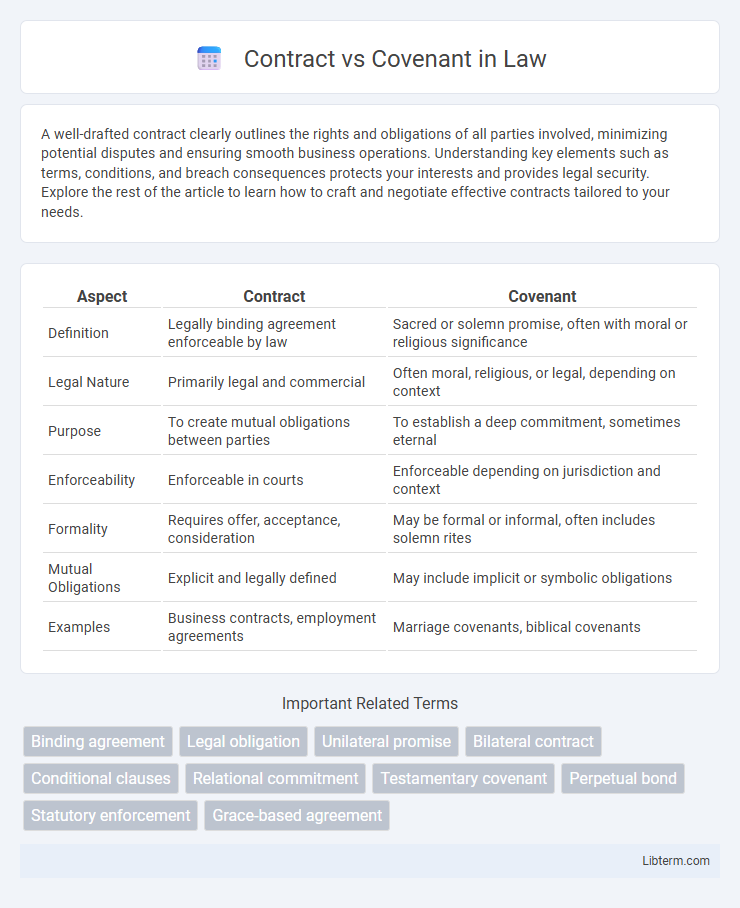A well-drafted contract clearly outlines the rights and obligations of all parties involved, minimizing potential disputes and ensuring smooth business operations. Understanding key elements such as terms, conditions, and breach consequences protects your interests and provides legal security. Explore the rest of the article to learn how to craft and negotiate effective contracts tailored to your needs.
Table of Comparison
| Aspect | Contract | Covenant |
|---|---|---|
| Definition | Legally binding agreement enforceable by law | Sacred or solemn promise, often with moral or religious significance |
| Legal Nature | Primarily legal and commercial | Often moral, religious, or legal, depending on context |
| Purpose | To create mutual obligations between parties | To establish a deep commitment, sometimes eternal |
| Enforceability | Enforceable in courts | Enforceable depending on jurisdiction and context |
| Formality | Requires offer, acceptance, consideration | May be formal or informal, often includes solemn rites |
| Mutual Obligations | Explicit and legally defined | May include implicit or symbolic obligations |
| Examples | Business contracts, employment agreements | Marriage covenants, biblical covenants |
Understanding Contracts and Covenants
Contracts are legally binding agreements between parties that outline specific duties, rights, and obligations enforceable by law. Covenants, while similar, often carry a moral or religious significance and may impose promises that extend beyond legal requirements, frequently found in property or religious contexts. Understanding the distinction helps in recognizing that contracts prioritize enforceability and reciprocity, whereas covenants emphasize commitment and trust.
Historical Origins of Contracts and Covenants
Contracts originated in ancient Mesopotamia as formal agreements governed by written codes such as the Code of Hammurabi, emphasizing legal obligations and enforceability. Covenants trace back to biblical traditions, particularly in ancient Israel, where they represented solemn, often divine promises establishing moral and communal duties beyond legal contracts. Historical distinctions highlight contracts as transactional and legally binding, while covenants carry spiritual and relational significance rooted in early religious and cultural practices.
Legal Definitions: Contract vs Covenant
A contract is a legally enforceable agreement between two or more parties outlining specific obligations, while a covenant is a solemn promise or agreement often found within contracts or deeds that imposes duties or restrictions on the parties. Contracts typically require offer, acceptance, consideration, and mutual intent, whereas covenants emphasize the binding nature of promises and may be used to create long-term obligations, such as in real property law. Legal courts enforce contracts primarily through damages or specific performance, whereas covenants are often enforced through injunctions or equitable remedies.
Key Elements of a Contract
A contract involves an offer, acceptance, mutual consent, and consideration as key elements essential to its enforceability under law. Each party must have the legal capacity to enter the agreement, and the contract's terms must be clear, lawful, and possible to perform. Unlike covenants, contracts primarily address the exchange of promises creating legal obligations, emphasizing precise terms and conditions for performance.
Essential Components of a Covenant
A covenant involves a solemn and binding agreement with essential components including mutual promises, clear terms, and often a spiritual or moral obligation underpinning the commitment. Unlike a standard contract, a covenant emphasizes enduring loyalty and trust between parties, reinforced by specific conditions and consequences for breach. The essential elements ensure that the covenant transcends a mere legal arrangement, encapsulating a profound, lasting bond.
Differences in Enforceability
Contracts are legally binding agreements enforceable by courts, requiring clear offer, acceptance, and consideration, ensuring parties fulfill obligations or face legal consequences. Covenants, often found in real estate or religious contexts, may be enforceable based on their nature as promises or moral commitments, but their enforceability depends on jurisdiction and specific terms, sometimes lacking the strict legal remedies available for contracts. Enforceability differences hinge on legal recognition, with contracts providing stronger, more straightforward judicial enforcement compared to covenants, which may rely on equitable remedies or community enforcement.
Contractual Obligations vs Covenant Commitments
Contractual obligations legally bind parties to specific duties enforceable by law, often involving clear terms, deadlines, and penalties for breach. Covenant commitments typically involve solemn promises rooted in moral, ethical, or religious contexts, emphasizing ongoing faithfulness and trust rather than strict legal enforcement. While contracts prioritize explicit performance criteria and remedies, covenants underscore enduring relationships and mutual respect beyond formal penalties.
Common Uses in Modern Law
Contracts in modern law primarily govern commercial transactions, employment agreements, and service provisions by legally binding parties to specific terms and conditions enforceable through courts. Covenants often appear in real estate, restricting property use or ensuring maintenance obligations, and in religious or communal agreements where mutual promises reflect moral or spiritual commitments beyond mere commerce. Both instruments form the foundation of legal relationships, but contracts emphasize exchange and consideration, while covenants stress enduring obligations tied to property or communal values.
Real-life Examples: Contracts and Covenants
In real-life scenarios, contracts often govern employment agreements where specific duties and payment terms are legally binding, such as a formal job contract outlining salary and responsibilities. Covenants commonly appear in property law, like restrictive covenants limiting land use to maintain neighborhood aesthetics or preserve environmental features. Unlike contracts, covenants tend to bind successors and future owners, ensuring long-term adherence to agreed-upon conditions.
Choosing Between Contract and Covenant
Choosing between a contract and a covenant depends on the desired degree of formality and binding commitment. Contracts are legally enforceable agreements with clearly defined terms and obligations, often used in business or transactional settings to ensure compliance. Covenants emphasize trust and moral obligation, typically appearing in long-term relationships where mutual responsibility and faithfulness are prioritized over strict legal enforcement.
Contract Infographic

 libterm.com
libterm.com